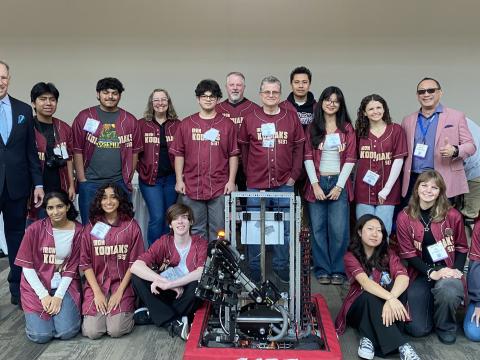One Small Step Taken. One Giant Leap Needed.
Unlike my colleague Maryann Lawlor, who was told she could be one of three things growing up–a teacher, a nurse or a nun–I was never told I could not do something because I was a girl. I never felt like I had to be quiet in class to get a good grade or let my older brother win video games to make him like me. I played soccer and swam on the swim team just like all the boys, and later was a lifeguard alongside many of them. I treated them as equals and felt respected in return. They were simply my friends.
Going to school was enjoyable. I was always a good student—honor roll, National Honor Society, advanced placement (AP) classes, the works. My parents, teachers and peers told me I could be anything and I truly believed them. But I was never encouraged to be a scientist or pursue a career in science, technology, engineering and mathematics (STEM). It was a bit outside my comfort zone.
I got A’s in English and later was heavily involved in the high school newspaper. Through all of grade school I struggled with science classes and had to work twice as hard to get B’s. But I was good at math and enjoyed it, making it as far as trigonometry in high school. I wish someone had pushed me to reach farther, to explore math and science more and get to a place outside of my comfort zone where the so-called “magic” happens.
It’s a double-edged sword when the next step is college. You want good grades to get into a top school and aren’t necessarily willing to take a risk on a more advanced science class you may or may not get an A in. You stick with what you are already excelling at but then you miss out on discovering something new you might want to study in undergrad. Plus no popular girl on the field hockey team was taking AP biology or talking about computer science.
In her interview for SIGNAL’s award-winning women in STEM series, Maj. Gen. Sandra Finan, USAF, deputy CIO for C4 and information infrastructure capabilities, echoes similar concerns. She stresses the importance of education and working to increase the popularity of STEM education—particularly among girls—as disciplines that are creative, relevant and fun. “We need to start attracting people at a very young age, which means we have to invest in mentoring and engagement programs where we get out as early as possible in elementary schools and get youngsters interested in the technology,” she says.
“More and more, we're not exposing our young children to all of that technology,” Gen. Finan shares. “When it comes time for them to make a choice, it never occurs to them to choose a hard technical field.”
Teachers and administrators must work at making STEM relevant in order to make it real, says Christine Royce, department chairperson and professor of teacher education at Shippensburg University in Pennsylvania. “We need to make science cool in the early grades and continue moving that mindset into the middle grades,” Royce says. “It's about engaging them and getting them to think in different ways. Sometimes, that's the teacher finding that little bit of information—a book, an activity, a video—that gives them something else to think about besides what's just done in class.”
As a young journalist who now covers science, technology and cybersecurity daily, I’m grateful for the writing skills I cultivated, but can’t help but think that it would have been rewarding and exciting to work in a STEM field. And after speaking with and reading about the women who work in these fields, I feel silly that I didn’t think I was good enough to be a scientist simply because those classes were a little harder. A teacher or mentor telling me it isn’t so scary and it can be fun would have been incredibly helpful. Perhaps then I would be the one being interviewed for my own cutting-edge technology instead of just writing about it.
Has the gender gap changed since the 1970s? A bit. Be sure to read Part Inspiration, Part Determination for a an older generation's perspective of this issue.
For the second year, TechNet Augusta will feature an all-women panel. Join the discussion at the Women in Cyber session at 1:30 p.m. on August 9.




Comments